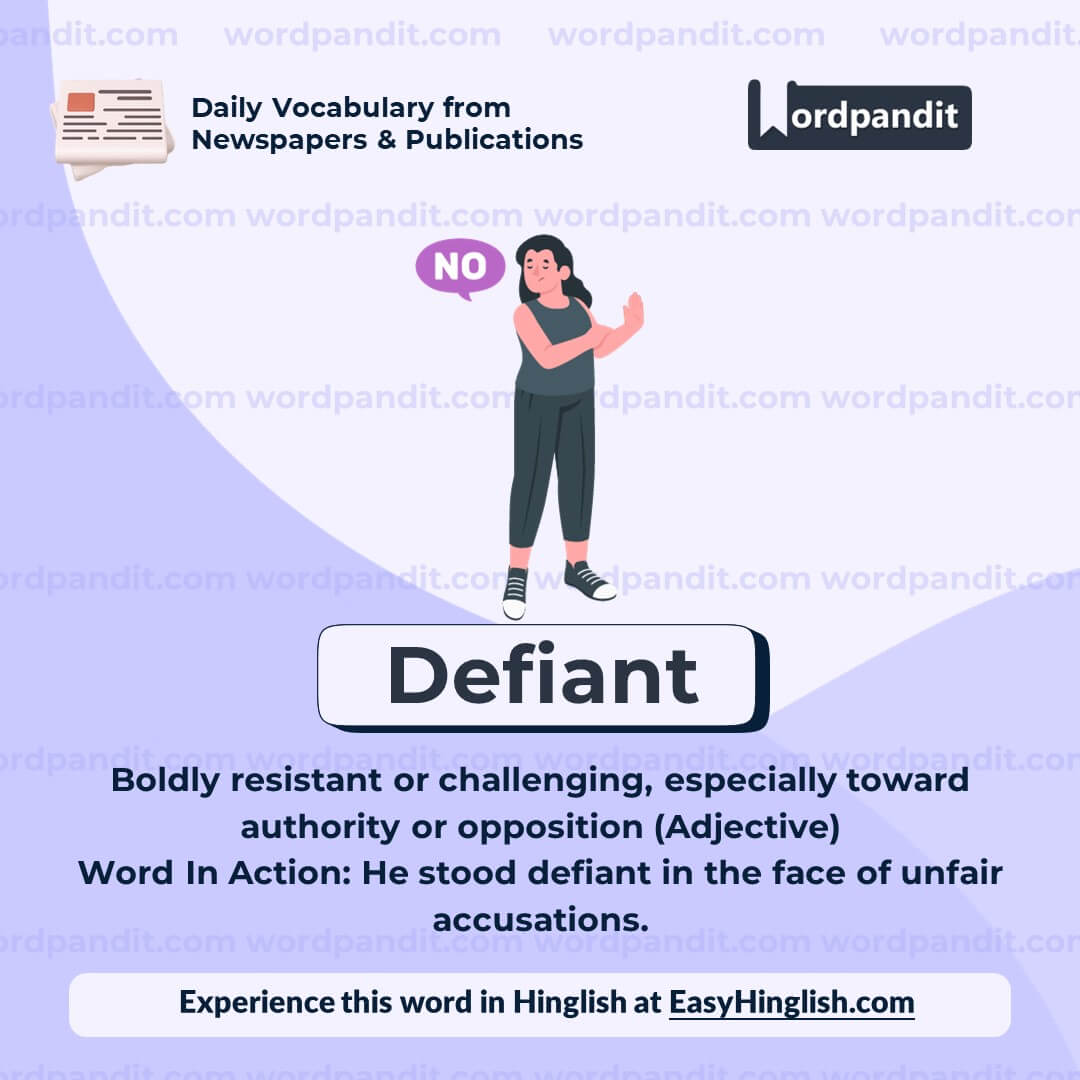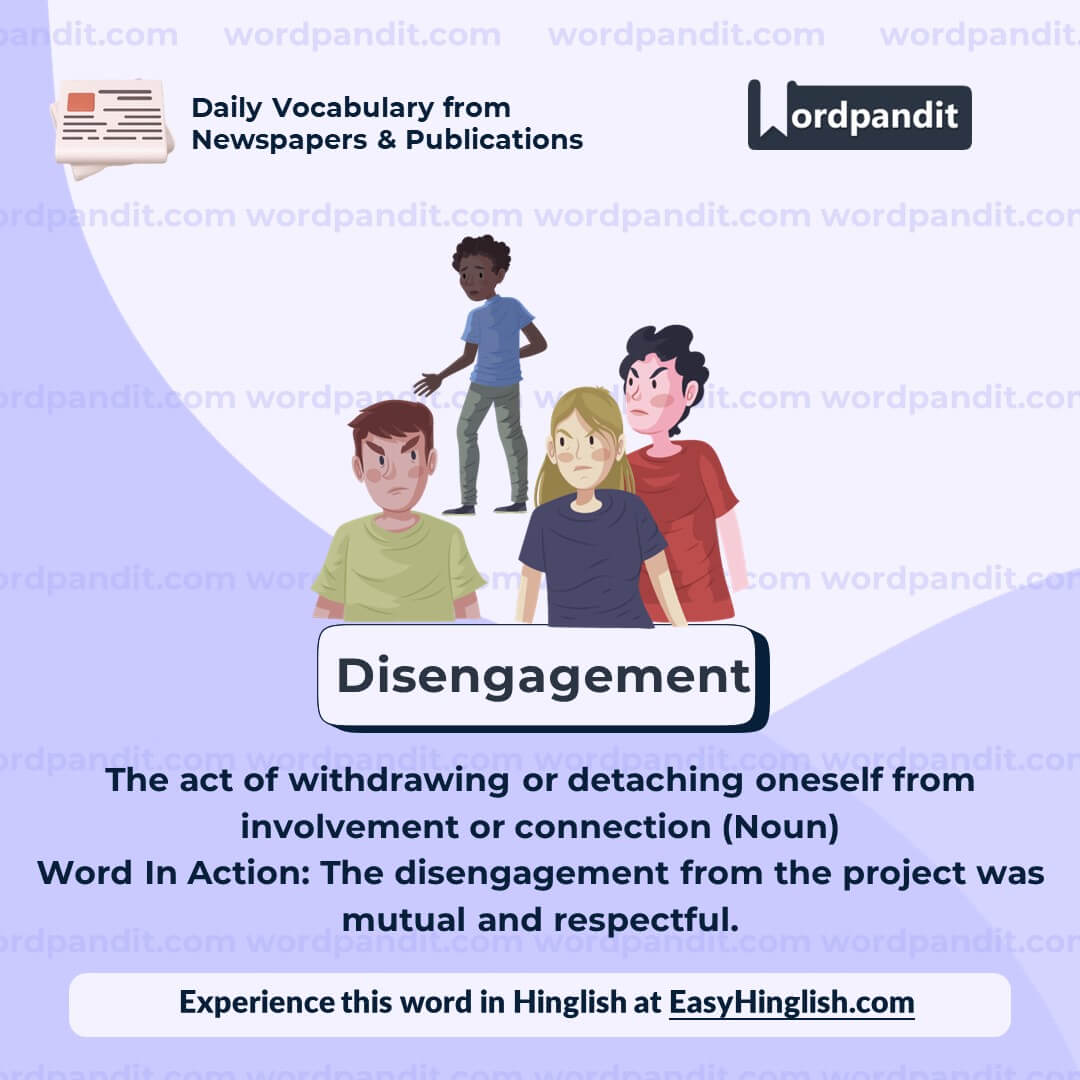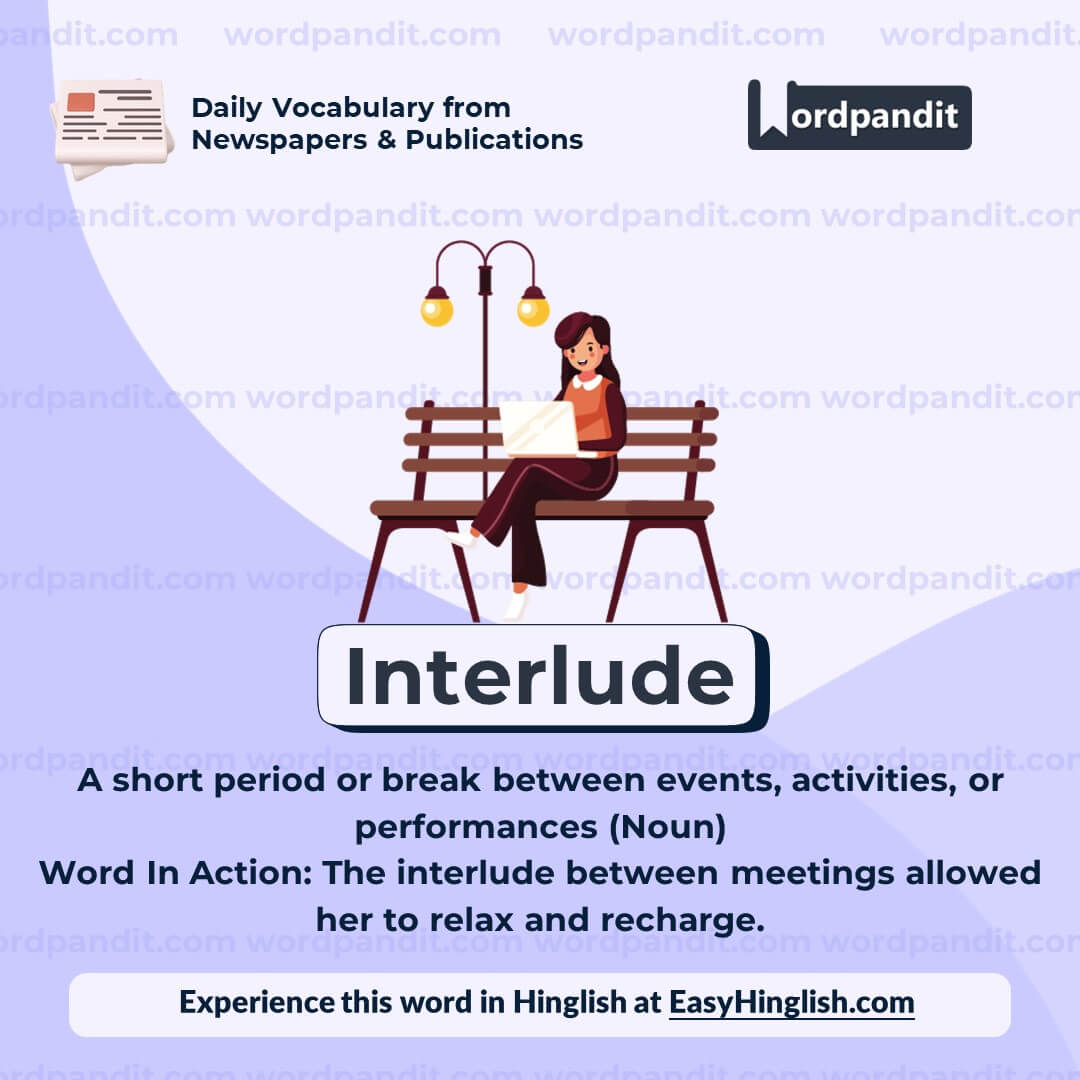Daily Vocabulary from Indian Newspapers and Publications
Welcome to Wordpandit’s Indian Vocabulary Hub
At Wordpandit, we understand the importance of staying rooted in the local context while expanding your language skills. This section focuses on enriching your vocabulary with words and phrases drawn from India’s leading newspapers and publications, ensuring you're learning vocabulary that is practical, relevant, and uniquely Indian.
Why Indian Sources Matter
We believe that the best way to master any language is by immersing yourself in local content. That’s why we carefully curate vocabulary from top Indian publications, including:
- The Hindu
- The Times of India
- The Economic Times
- Hindustan Times
- Live Mint
- The Indian Express
- And many others...
Stay Updated, Stay Relevant
With daily updates from Indian news sources, you’ll be consistently learning words that reflect the trends and shifts in Indian society and culture. Our focus is to provide vocabulary that enhances your understanding of the language in an Indian context.
How Wordpandit Supports Your Goals
Whether you’re preparing for exams, aiming to improve your professional communication, or simply want to stay connected with the latest Indian vocabulary, Wordpandit is here to guide you every step of the way.
Learn with a Practical Approach
Our interactive learning methodology includes real-world examples, engaging activities, and context-specific usage to ensure that every word becomes part of your active vocabulary.
Dive into Indian Vocabulary Today!
Why Choose Wordpandit?
Practical Learning: Focus on words you'll actually encounter in real-world reading, enhancing your comprehension and communication skills.
Diverse Content: From current affairs to scientific breakthroughs, our varied sources expose you to vocabulary across multiple domains.
Effortless Integration: Make Wordpandit a part of your daily routine. Just a few minutes each day can significantly boost your lexicon over time.
Your Path to Vocabulary Mastery
- Visit our Daily Vocabulary section regularly
- Explore new words and their usage in context
- Practice incorporating these words into your own writing and speech
- Track your progress as your vocabulary expands
Start Your Journey Today
Embark on your vocabulary enhancement journey with Wordpandit. By consistently engaging with our daily posts, you'll build a robust vocabulary that serves you well in academic, professional, and personal contexts.
Remember, a word a day keeps linguistic limitations at bay. Make Wordpandit your daily companion in the quest for vocabulary excellence!
WORD-1: Defiant
Context:
"The chips are down, I rise up!” This statement, emblematic of Donald Trump’s defiant spirit, reflects the essence of his bold approach to politics and economics." - The Wire
Explanatory Paragraph:
The word "defiant" describes a bold or resistant attitude, often in the face of opposition or authority. It characterizes a person or behavior that openly challenges norms or expectations, demonstrating courage, stubbornness, or determination.
Meaning: Boldly resistant or challenging, especially toward authority or opposition (Adjective).
Pronunciation: dih-FY-uhnt
Difficulty Level: ⭐⭐⭐ Intermediate
Etymology: Originates from the Latin word "defiantem," meaning "challenging or defying," which evolved into the Old French "defier" (to defy).
Synonyms & Antonyms:
Synonyms: Rebellious, resistant, insubordinate, obstinate
Antonyms: Compliant, submissive, obedient, acquiescent
Usage Examples:
- The child’s defiant glare made it clear that she had no intention of apologizing.
- In a defiant gesture, the protesters refused to disperse despite police orders.
- Her defiant attitude towards criticism helped her succeed against all odds.
- He remained defiant, even when faced with overwhelming evidence of his wrongdoing.
Cultural Reference:
"Give me liberty, or give me death!" - Patrick Henry’s defiant cry during the American Revolution epitomized the spirit of rebellion against oppression.
Think About It:
Can defiance be considered a positive trait in certain situations? When does it cross the line into stubbornness or arrogance?
Quick Activity:
Write a short paragraph describing a moment when you or someone you admire acted defiantly in the face of adversity. What was the outcome?
Memory Tip:
Remember "defiant" by thinking of "defy" and "ant" – visualize an ant boldly defying gravity by carrying a leaf much larger than itself.
Real-World Application:
"Defiant" is often used to describe political leaders, activists, or individuals who stand firm against pressure or adversity, highlighting their resilience and determination.
WORD-2: Commence
Context:
"Erupted in Palestine and Zionist militias commenced what was later termed Plan Dalet – a systematic ethnic cleansing of Arab neighbourhoods, towns and villages from areas within the territory." - The Wire
Explanatory Paragraph:
The word "commence" refers to the act of starting or beginning something. It is often used in formal or significant contexts to indicate the initiation of an event, activity, or process. In the given context, it highlights the start of an operation with a notable impact.
Meaning: To begin or start (verb).
Pronunciation: kuh-mens
Difficulty Level: ⭐⭐ Beginner
Etymology: Derived from Old French "comencier," meaning "to begin," and from Latin "cominitiare," where "com-" means "together" and "initiare" means "to begin."
Synonyms & Antonyms:
Synonyms: Begin, start, initiate, launch, inaugurate
Antonyms: End, conclude, finish, terminate, cease
Usage Examples:
- The ceremony will commence at 10:00 AM sharp, so please be on time.
- After months of planning, the construction of the bridge finally commenced.
- The professor asked the students to commence their presentations without delay.
- The festival commenced with a grand fireworks display over the river.
Cultural Reference:
"Commencement" is often associated with graduation ceremonies, marking the start of a new chapter in students' lives. The term is rooted in the idea of beginnings rather than endings.
Think About It:
Why do you think "commence" is often preferred in formal or ceremonial contexts over simpler words like "start"?
Quick Activity:
Write a short paragraph using the word "commence" to describe the beginning of an important event in history or your personal life.
Memory Tip:
Remember "commence" by thinking of a commencement ceremony, which marks the beginning of a new journey after graduation.
Real-World Application:
The word "commence" is widely used in formal announcements, legal documents, and speeches to signify the start of significant processes or events.
WORD-3: Pursuant
Context:
"The lines of this ceasefire within mandatory Palestine came to be known as the “green line”. In 1967, pursuant to the so-called Six Days War, Israel occupied the entirety of mandatory Palestine." - The Wire
Explanatory Paragraph:
The word "pursuant" is used to indicate that something follows logically or is in accordance with a law, rule, or agreement. In the provided context, it suggests that the events of 1967 happened as a consequence of the Six Days War.
Meaning: In accordance with or as a result of something (Preposition).
Pronunciation: pur-SOO-uhnt
Difficulty Level: ⭐⭐⭐ Intermediate
Etymology: Originates from the Old French word "poursuivre," meaning "to follow," which in turn comes from Latin "prosequi" (to pursue or follow).
Synonyms & Antonyms:
Synonyms: In accordance with, following, consistent with
Antonyms: Contradictory to, opposed to, inconsistent with
Usage Examples:
- The company modified its policy pursuant to the new government regulations.
- Pursuant to our agreement, the project must be completed by next month.
- The ruling was made pursuant to established judicial precedents.
- He acted pursuant to his responsibilities as a manager.
Cultural Reference:
"Pursuant to" is a phrase often encountered in legal and diplomatic documents, illustrating the formal tone of such texts. For example, in international treaties, this phrase is used to highlight actions taken in accordance with specific clauses or agreements.
Think About It:
How does the use of "pursuant" help clarify relationships between actions and their legal or formal justifications?
Quick Activity:
Write a short paragraph using "pursuant" to explain a rule or regulation that you follow in daily life.
Memory Tip:
Think of "pursuant" as something that "pursues" or follows logically or legally, helping you remember its meaning as being "in accordance with."
Real-World Application:
"Pursuant" is frequently used in legal, academic, and formal documents to link actions to rules or outcomes, making it essential for understanding contracts, treaties, and policies.
WORD-4: Disengagement
Context:
"With this renewed focus on protectionism and disengagement, the question arises: what will this mean for the future of global trade and the US economy?" - The Wire
Explanatory Paragraph:
"Disengagement" refers to the process of withdrawing involvement or connection from something, whether it is an activity, relationship, or policy. In the context of the sentence, it implies a deliberate move away from active participation in global trade and international cooperation.
Meaning: The act of withdrawing or detaching oneself from involvement or connection (Noun).
Pronunciation: dis-en-GAYJ-ment
Difficulty Level: ⭐⭐ Basic
Etymology: Derived from the prefix "dis-" (indicating reversal) and "engagement," which comes from Old French "engagier," meaning "to pledge or involve."
Synonyms & Antonyms:
Synonyms: Withdrawal, detachment, separation
Antonyms: Involvement, engagement, connection
Usage Examples:
- The disengagement of the troops marked the end of the conflict.
- Her disengagement from social media improved her mental health significantly.
- Economic disengagement from global markets could lead to isolation and stagnation.
- The company's disengagement from the project was unexpected and left the partners in a difficult position.
Cultural Reference:
The term "disengagement" gained prominence during the Cold War era, referring to strategies aimed at reducing involvement in international conflicts or alliances, signaling shifts in foreign policy.
Think About It:
What are the potential risks and benefits of disengagement in global politics or trade?
Quick Activity:
List three areas in your life or society where disengagement might be beneficial and three where it could be harmful. Explain why.
Memory Tip:
Picture a gear (engagement) that suddenly stops working or separates (disengagement). This imagery can help you recall the meaning of the word as "detachment or withdrawal."
Real-World Application:
"Disengagement" is often used in discussions about politics, trade, or personal relationships, emphasizing the act of stepping back from a prior commitment or involvement. Understanding this term is key in analyzing shifts in strategies or behaviors.
WORD-5: Interlude
Context:
"President Trump prepares to take charge on January 20 after a short-lived interlude, his approach to the ‘tariff games’." - The Wire
Explanatory Paragraph:
"Interlude" refers to a brief period of time that interrupts an event or sequence. It often serves as a pause or break, providing a moment of transition or change before resuming the main activity.
Meaning: A short period or break between events, activities, or performances (Noun).
Pronunciation: IN-ter-lood
Difficulty Level: ⭐⭐ Easy
Etymology: Derived from the Latin "interludium," where "inter-" means "between" and "ludus" means "play or game," originally referring to a light performance between acts of a play.
Synonyms & Antonyms:
Synonyms: Pause, interval, break, hiatus
Antonyms: Continuation, persistence, resumption
Usage Examples:
- The play’s interlude allowed the audience to discuss the first act over coffee.
- The calm interlude between storms gave the rescue team time to prepare.
- The brief interlude of peace was shattered by the sounds of conflict.
- He used the interlude in his busy day to catch up on some much-needed rest.
Cultural Reference:
Interludes are commonly used in theater and film, such as the musical interludes in Shakespearean plays, which served as a way to entertain audiences between acts.
Think About It:
Can interludes in life, such as breaks or pauses, be as important as the main events? How do they contribute to overall progress or creativity?
Quick Activity:
Identify an "interlude" in your daily routine. Write about how it helps you recharge or shift focus.
Memory Tip:
Picture a theater performance pausing for a light-hearted interlude – this "in-between" break can help you remember its meaning.
Real-World Application:
"Interlude" is often used to describe breaks in work, storytelling, or even significant events, emphasizing the value of pauses in maintaining balance and clarity.


















